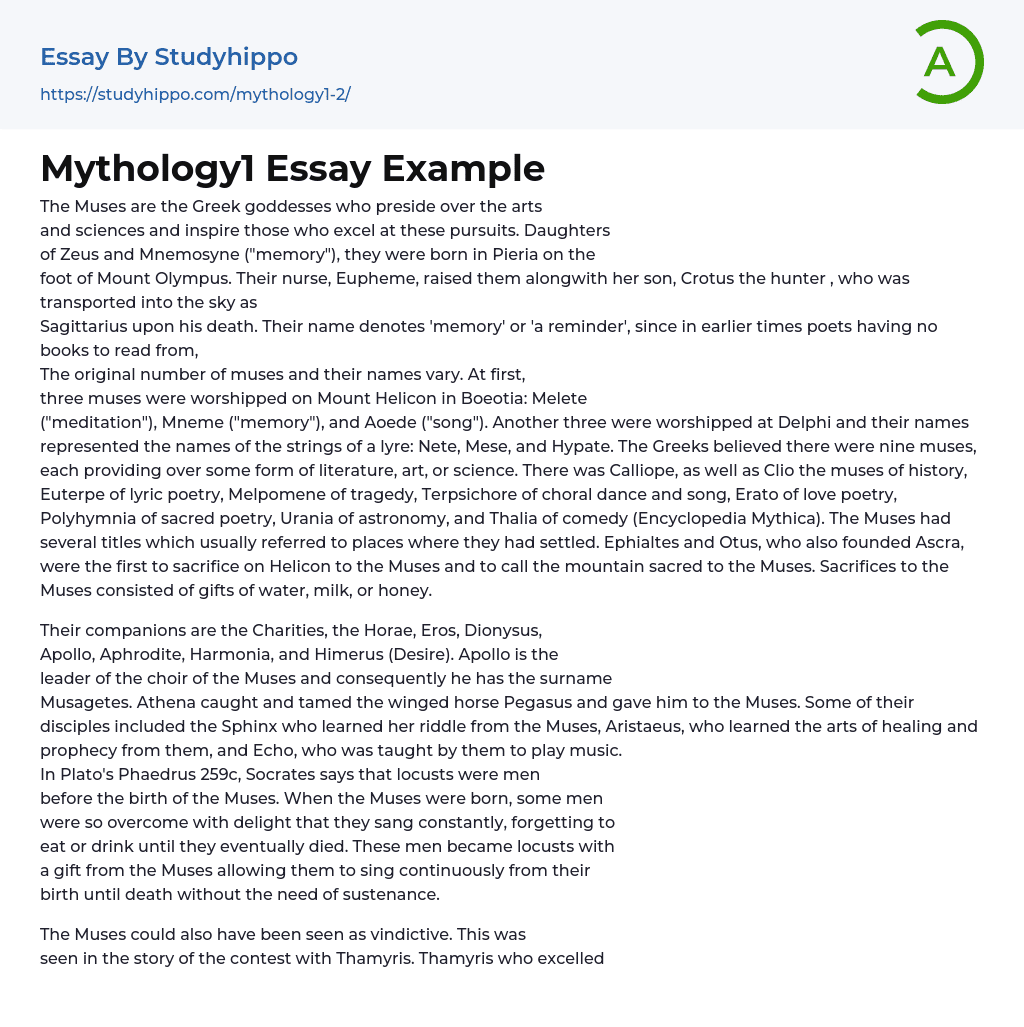The Muses are the Greek goddesses who preside over the arts and sciences and inspire those who excel at these pursuits.
Daughters of Zeus and Mnemosyne ("memory"), they were born in Pieria on the foot of Mount Olympus. Their nurse, Eupheme, raised them along with her son, Crotus the hunter, who was transported into the sky as Sagittarius upon his death.
Their name denotes 'memory' or 'a reminder', since in earlier times poets having no books to read from.
The original number of muses and their names vary. At first, three muses were worshipped on Mount Helicon in Boeotia: Melete ("meditation"), Mneme ("memory"), and Aoede ("song").
Another three were worshipped at Delphi and their names represented the names of the strings of a lyre: Nete, Mese, and Hypate.
The Greeks believed there were nine muses, each presiding over some form of lite
...rature, art, or science.
There was Calliope, as well as Clio the muses of history, Euterpe of lyric poetry, Melpomene of tragedy, Terpsichore of choral dance and song, Erato of love poetry, Polyhymnia of sacred poetry, Urania of astronomy, and Thalia of comedy (Encyclopedia Mythica).
The Muses had several titles which usually referred to places where they had settled. Ephialtes and Otus, who also founded Ascra, were the first to sacrifice on Helicon to the Muses and to call the mountain sacred to the Muses. Sacrifices to the Muses consisted of gifts of water, milk, or honey.
The Muses have companions such as the Charities, the Horae, Eros, Dionysus,
Apollo, Aphrodite, Harmonia, and Himerus (Desire). Apollo, known as Musagetes, leads the choir of the Muses. Athena tamed and gifted the winged horse Pegasus to the Muses. Some of those influenced by the
Muses were the Sphinx, who learned her riddle from them, Aristaeus, who learned healing and prophecy from them, and Echo, who was taught music by them.
In Plato's Phaedrus 259c, Socrates describes how locusts were once humans before the Muses were born. Upon the Muses' birth, some men were so overcome with joy that they sang incessantly without eating or drinking until they eventually perished. These men transformed into locusts and were gifted by the Muses with the ability to sing continuously from birth until death without needing sustenance.
The Muses were also perceived as vengeful, as evidenced by the tale of the contest with Thamyris. Thamyris, a talented musician, challenged the Muses to a musical competition in Dorium, Messenia. The agreement was that if he emerged victorious, he would be rewarded by all of them. However, the Muses emerged as winners and denied Thamyris his desired reward.
In another narrative, the king and queen of Emathia (Macedonia), Euippe, had nine daughters who were named after the Muses. These daughters engaged in a contest with the Muses but were defeated. As punishment, the Muses transformed them into birds known as Colymbas, Iynx, Cenchris, Cissa, Chloris, Acalanthis, Nessa, Pipo, and Dracontis (Graves 170.q).
These names of birds, such as the wryneck, hawk, jay, duck, goldfinch, and four others without modern equivalents, were taken from actual bird names.
According to Hathorn, another myth states that Hera, the queen of the gods, convinced the Sirens to compete in a singing contest with the Muses. In early Greek mythology, the Sirens were described as bird-bodied creatures with beautiful women's heads. The Muses won the contest and plucked out all of the Sirens' feathers.
The
Valley of the Muses in Thespies on Mt. Helicon was a famous place dedicated to the Muses. It started its "Mouseai" festivals in the 6th c. BC and was organized by the Thespians every 5 years. Poets and musicians from all over Greece participated in various games such as epic, poetry, rapsodia, kithara, aulos, satiric poetry, tragedy, and comedy. Ancient schools commonly had a shrine to the Muses called a mouseion, which is where the modern term 'museum' originated from. The renowned Museum of Alexandria, established by Ptolemy I, was a temple devoted to the Muses. Before reciting their work, poets and storytellers often invoked the inspiration and protection of the Muses (Hathorn 169).
Bibliography:
- Creation Myth essays
- Creation Vs Evolution essays
- Agriculture essays
- Albert einstein essays
- Animals essays
- Archaeology essays
- Bear essays
- Biology essays
- Birds essays
- Butterfly essays
- Cat essays
- Charles Darwin essays
- Chemistry essays
- Dinosaur essays
- Discovery essays
- Dolphin essays
- Elephant essays
- Eli Whitney essays
- Environmental Science essays
- Evolution essays
- Fish essays
- Genetics essays
- Horse essays
- Human Evolution essays
- Isaac Newton essays
- Journal essays
- Linguistics essays
- Lion essays
- Logic essays
- Mars essays
- Methodology essays
- Mineralogy essays
- Monkey essays
- Moon essays
- Mythology essays
- Noam Chomsky essays
- Physics essays
- Plate Tectonics essays
- Progress essays
- Reaction Rate essays
- Roman Numerals essays
- Scientific essays
- Scientific Method essays
- Scientist essays
- Seismology essays
- Space Exploration essays
- Stars essays
- Sun essays
- Thomas Edison essays
- Tiger essays




